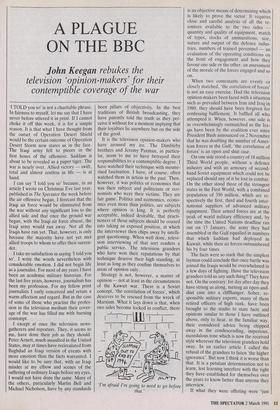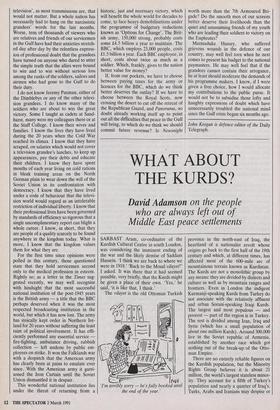A PLAGUE ON THE BBC
John Keegan rebukes the
television 'opinion-makers' for their contemptible coverage of the war
'I TOLD you so' is not a charitable phrase. In fairness to myself, let me say that I have never before uttered it in print. If I cannot choke it off this week, it is for a simple reason. It is that what I have thought from the outset of Operation Desert Shield would be the certain outcome of Operation Desert Storm now stares us in the face. The Iraqi army fell to pieces in the first hours of the offensive. Saddam is about to be revealed as a paper tiger. The war is nearly over. Allied victory — swift, total and almost costless in life — is at hand.
I can say 'I told you so' because, in an article I wrote on Christmas Eve last year, published in The Spectator the week before the air offensive began, I forecast that the Iraqi air force would be eliminated from the war without any significant loss to the allied side and that once the ground war began, with the Iraqi air force absent, the Iraqi army would run away. Not all the Iraqis have run yet. That, however, is only because the majority have not yet met allied troops to whom to offer their surren- der.
I take no satisfaction in saying 'I told you so'. I write the words nevertheless with considerable emotion. I did not begin life as a journalist. For most of my years I have been an academic military historian. For the last five years, however, journalism has been my profession. For my fellow print journalists I early conceived and retain a warm affection and regard. But in the case of some of those who practise the profes- sion in the television medium their cover- age of the war has filled me with burning contempt.
I except at once the television news- gatherers and reporters. They, it seems to me, have done their job as they should. Peter Arnett, much assaulted in the United States, may at times have recirculated from Baghdad an Iraqi version of events with more emotion than the facts warranted. I would like to be sure that, with an Iraqi minder at my elbow and scenes of the suffering of ordinary Iraqis before my eyes, I would not have done the same. Many of the others, particularly Martin Bell and Michael Nicholson, have by any standards been pillars of objectivity. In the best traditions of British broadcasting, they have patently told the truth as they per- ceive it without for a moment implying that their loyalties lie anywhere but on the side of the good.
It is the television opinion-makers who have aroused my ire. The Dimbleby brothers and Jeremy Paxman, in particu- lar, seem to me to have betrayed their responsibilities to a contemptible degree. I have watched their technique with mesme- rised fascination. I have, of course, often watched them in action in the past. Then, however, it was politics or economics that was their subject and politicians or eco- nomists who were their victims. They are fair game. Politics and economics, econo- mics even more than politics, are subjects where opinion is king. It is perfectly acceptable, indeed desirable, that practi- tioners of those subjects should be coaxed into taking an exposed position, at which the interviewer then chips away by intelli- gent questioning. When well done, televi- sion interviewing of that sort renders a public service. The television grandees who have won their reputations by that technique deserve their high standing, at least as long as they confine themselves to areas of opinion only.
Strategy is not, however, a matter of opinion — not at least in the circumstances of the Kuwait war. There is a Soviet concept, 'the correlation of forces', which deserves to be rescued from the wreck of Marxism. What it lays down is that, when two sides become locked in conflict, there 'I'm afraid I'm going to need to go before that.' is an objective means of determining which is likely to prove the victor. It requires close and careful analysis of all the re- sources available to the two sides quantity and quality of equipment, match of types, stocks of ammunitions, size, nature and output of the defence indus- tries, numbers of trained personnel — an evaluation of the operating conditions on the front of engagement and how they favour one side or the other, an assessment of the morale of the forces engaged and so on.
When two contestants are evenly or closely matched, 'the correlation of forces' is not an easy exercise. Had the television opinion-makers been faced with a situation such as prevailed between Iran and Iraq in 1980, they should have been forgiven for confessing bafflement. It baffled all who attempted it. When, however, one side is as overwhelmingly outmatched as the Ira- qis have been by the coalition ever since President Bush announced on 2 November that he was doubling the number of Amer- ican forces in the Gulf, 'the correlation of forces' is an open and shut case.
On one side stood a country of 18 million Third World people, without a defence industry and with an armoury of second- hand Soviet equipment which could not be replaced should any of it be lost in combat. On the other stood three of the strongest states in the First World, with a combined population of 350 million, which are re- spectively the first, third and fourth inter- national suppliers of advanced military equipment. Their armed forces are at the peak of world military efficiency and, by the time the United Nations deadline ran out on 15 January, the army they had assembled in the Gulf equalled in numbers that which Saddam had deployed in Kuwait, while their air forces outnumbered his by four times.
The facts were so stark that the simplest layman could conclude that once battle was joined the Iraqis would be overwhelmed in a few days of fighting. Have the television grandees told us any such thing? They have not. On the contrary: for day after day they have strung us along, turning an open-and- shut case into a cliffhanger. Sober, re- sponsible military experts, many of them retired officers of high rank, have been brought to the studio to state facts and opinions similar to those I have outlined above, only to hear, in the familiar way, their considered advice being chipped away in the condescending, imperious, incredulous tone which is now the received style wherever the television grandees hold sway. In an earlier article I called the refusal of the grandees to listen 'the higher ignorance'. But now I think it is worse than that. It is a petulant determination not to learn, lest learning interfere with the right they have established for themselves over the years to know better than anyone they interview.
If what they were offering were 'just television', as most transmissions are, that would not matter. But a whole nation has necessarily had to hang on the narcissistic grandees' words for the last months. Worse, tens of thousands of viewers who are relatives and friends of our servicemen in the Gulf have had their anxieties stretch- ed day after day by the relentless express- ion of professional doubt that the grandees have turned on anyone who dared to utter the simple truth that the allies were bound to win and to win without serious loss among the ranks of the soldiers, sailors and airmen who had gone to the Gulf to do their duty.
I do not know Jeremy Paxman, either of the Dimblebys or any of the other televi- sion grandees. I do know many of the soldiers who are about to win the great victory. Some I taught as cadets at Sand- hurst, many were my colleagues there or at the Staff College. I know their wives and families. I know the lives they have lived during the 20 years when the Cold War reached its climax. I know that they have scraped, on salaries which would not cover a television grandee's lunches, to keep up appearances, pay their debts and educate their children. I know they have spent months of each year living on cold rations in bleak training areas on the North German plain to wear down the will of the Soviet Union in its confrontation with democracy. I know that they have lived under a code of behaviour that the televi- sion world would regard as an intolerable restriction of individual liberty. I know that their professional lives have been governed by standards of efficiency so rigorous that a single uncomplimentary report can blight a whole career. I know, in short, that they are people of a quality scarcely to be found anywhere in the kingdom today. What is more, I know that the kingdom values them for what they are.
For the first time since opinions were polled in this century, those questioned state that they hold servicemen second only to the medical profession in esteem. Rightly so; as a letter in the Times sug- gested recently, we may well recognise with hindsight that the most successful national institution of the post-1945 years is the British army — a title that the BBC perhaps deserved when it was the most respected broadcasting institution in the world, but which it has now lost. The army has stoically kept order in Northern Ire- land for 20 years without suffering the least taint of political involvement. It has effi- ciently performed any essential service fire-fighting, ambulance driving, rubbish collection — left undone by public em- ployees on strike. It won the Falklands war with a despatch that the American army has clearly been at pains to emulate ever since. With the American army it garri- soned the Iron Curtain until the Soviet Union dismantled it in despair.
This wonderful national institution lies under the threat of returning from a historic, just and necessary victory, which will benefit the whole world for decades to come, to face heayy demobilisations under the programme of budgetary reductions known as 'Options for Change'. The Brit- ish army, 150,000 strong, probably costs some £4.5 billion a year to maintain. The BBC, which employs 23,000 people, costs £1.5 billion a year. Each BBC employee, in short, costs about twice as much as a soldier. Which, frankly, gives to the nation better value for money?
If, from our pockets, we have to choose between paying taxes for the army or licences for the BBC, which do we think better deserves the outlay? If we have to choose between the Royal Scots, now crossing the desert to cut off the retreat of the Republican Guard, and Panorama, no doubt already working itself up to point out all the difficulties that peace in the Gulf will bring, to which do we think we should commit future revenue? Is Newsnight worth more than the 7th Armoured Bri- gade? Do the smooth men of our screens better deserve their livelihoods than the quiet and unassuming friends of my youth who are leading their soldiers to victory on the Euphrates?
Marmaduke Hussey, who suffered grievous wounds in the defence of our country, may well feel torn when he next comes to present his budget to the national paymasters. He may well feel that if the grandees cannot contain their arrogance, he at least should moderate the demands of his programme makers. I know, if I were given a free choice, how I would allocate my contributions to the public purse. It would not be to subsidise those lofty and haughty expressions of doubt which have unnecessarily troubled the national mind since the Gulf crisis began six months ago.
John Keegan is defence editor of the Daily Telegraph.



















































 Previous page
Previous page